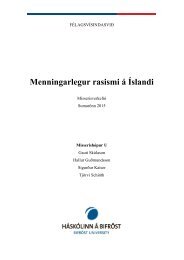Create successful ePaper yourself
Turn your PDF publications into a flip-book with our unique Google optimized e-Paper software.
WORLD REPORT 2016<br />
HUMAN RIGHTS WATCH<br />
Closure<br />
Israel’s punitive closure of the Gaza Strip, particularly the near-total blocking of<br />
outgoing goods, continued to have severe consequences for the civilian population<br />
and impeded reconstruction of the 17,000 housing units severely damaged<br />
or destroyed during the 2014 conflict.<br />
Egypt also blocked all regular movement of goods at the crossing it controls, and<br />
imposed increased restrictions on the movement of people. More than 70 percent<br />
of Gaza’s 1.8 million people are forced to rely on humanitarian assistance.<br />
Israel allowed incoming goods to Gaza that amounted to less than half of 2006<br />
pre-closure levels. From the August 2014 ceasefire until September 2015, 2 million<br />
tons of construction material entered the coastal strip through the only functioning<br />
crossing point for goods—about 9 percent of the total need, according to<br />
the Israeli rights group Gisha. As of September, Gaza was unable to build some<br />
250 new schools needed to adequately serve the population, according to<br />
Gisha.<br />
Egypt’s military-backed government maintained tight restrictions on the movement<br />
of Palestinians at the Rafah crossing between Gaza and Sinai, citing attacks<br />
by armed groups in the Sinai against Egyptian security forces. The crossing<br />
has been closed, including for humanitarian assistance, since October 24, 2014,<br />
except for 37 days of partial openings, according to the UN.<br />
A monthly average of about 2,000 Gaza residents passed through the crossing,<br />
down from 20,000 in 2013. Egypt did not permit regular imports or exports of<br />
goods through Rafah and destroyed or closed many of the tunnels beneath the<br />
border that have been used for smuggling, leading to increased prices and unemployment,<br />
particularly in the construction sector.<br />
Hamas and Palestinian Armed Groups<br />
The UN Commission of Inquiry report released in June regarding the 2014 Israel-<br />
Gaza war found that Palestinian armed groups committed serious violations, including<br />
firing mortars and rockets into populated areas of Israel, and<br />
unnecessarily firing from within or near civilians in Gaza, putting them at risk.<br />
In 2015 Palestinian armed groups launched 20 rockets into Israel from Gaza as of<br />
October 31, causing no casualties but generating fear in affected cities and<br />
towns. These rockets cannot be accurately aimed at military objectives and<br />
amount to indiscriminate or deliberate attacks on civilians when directed at Israeli<br />
population centers. Hamas, which has internal control over Gaza, is responsible<br />
for policing the border and acting to ensure that illegal attacks do not take<br />
place.<br />
The Hamas internal security agency and police allegedly tortured or ill-treated<br />
258 people as of July 31, according to complaints received by the Independent<br />
Commission for Human Rights (ICHR), a Palestinian rights body.<br />
West Bank<br />
Israel<br />
In the West Bank, as of November 27, Israeli security forces and settlers fatally<br />
shot at least 96 Palestinian civilians and wounded at least 10,854, including<br />
those suspected of attacking Israelis, according to UN and Human Rights Watch<br />
monitoring.<br />
In July, an Israeli colonel fatally shot Mohammed al-Kasbeh, 17, apparently while<br />
he was fleeing after throwing a rock at the colonel’s vehicle. In August, Israeli<br />
forces killed Falah Abu Marya and shot his son in the legs during a raid on the<br />
family’s home in Beit Ummar. According to witnesses, the soldiers did not face<br />
serious danger at the time of the shooting.<br />
During an escalation in violence that began in October, Israeli security forces<br />
and settlers killed 8 protesters and 28 others suspected of attacking Israelis. In<br />
some cases, video footage and witness accounts strongly suggest that excessive<br />
force was used. In some cases, security forces appeared to shoot multiple times<br />
suspected attackers who were lying on the ground, apparently neutralized, raising<br />
concerns of extrajudicial killings.<br />
Israeli authorities took inadequate action against Israeli settlers who injured<br />
Palestinians and destroyed or damaged Palestinian mosques, homes, schools,<br />
olive trees, cars, and other property. As of November 23, the UN reported 130<br />
such attacks in which settlers injured 84 Palestinians.<br />
In July, an arson attack, apparently carried out by Israelis, against two houses in<br />
the Palestinian village of Duma killed a toddler, Ali Dawabshe, and both his par-<br />
330<br />
331










